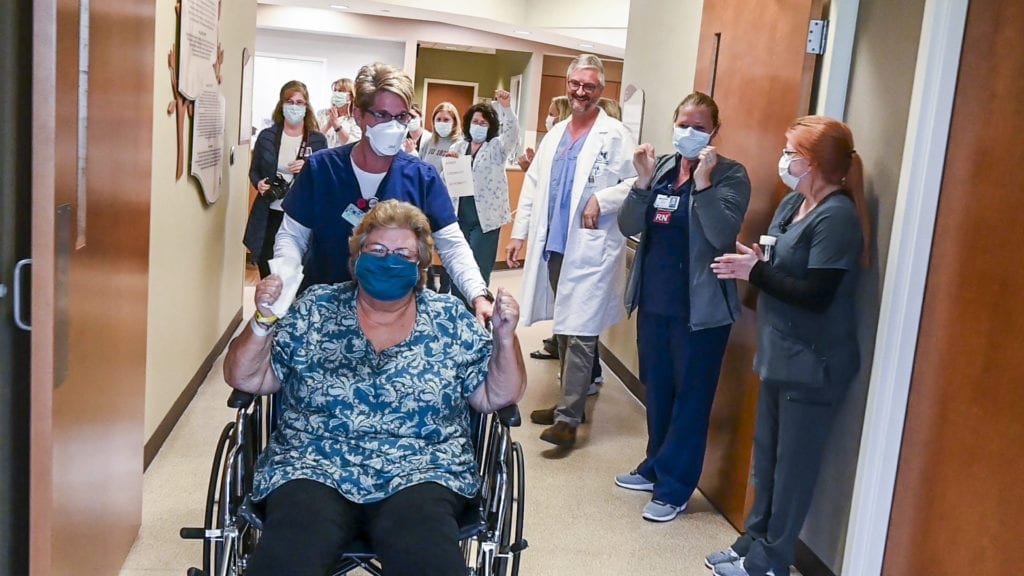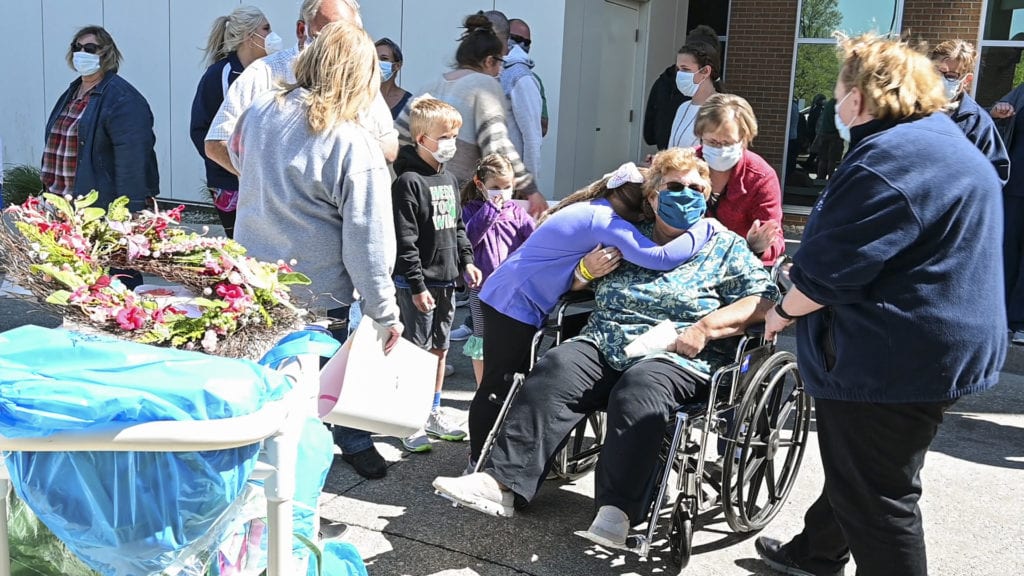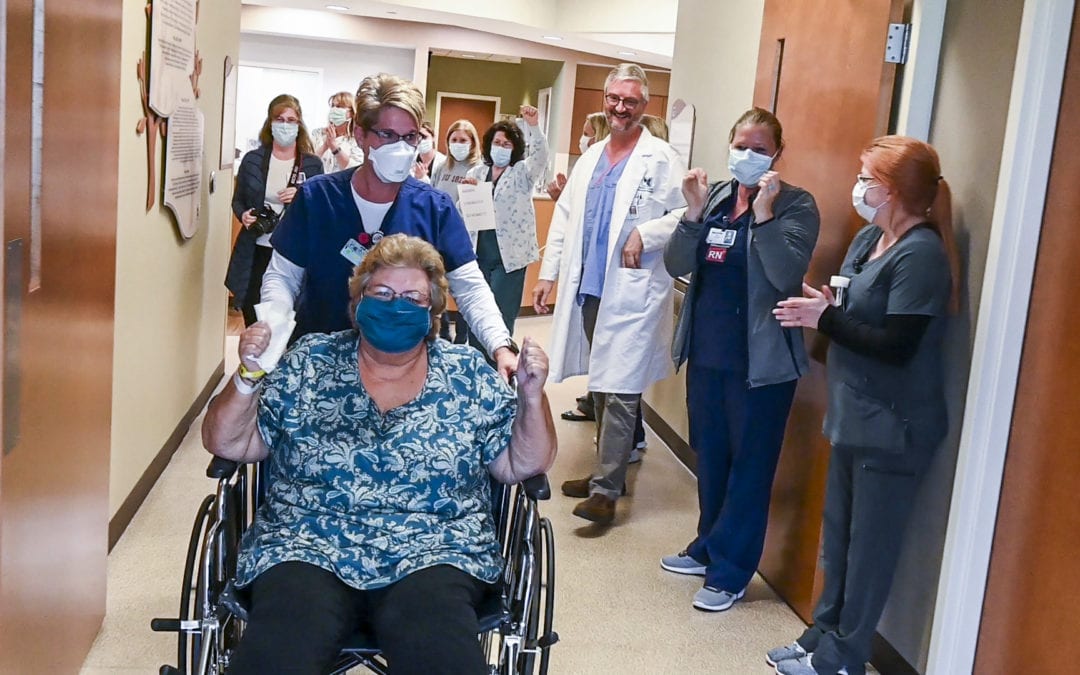Familiar faces lined the street as Greensburg native Wanda Lecher made her way home. She recognized so many of her neighbors, family and friends smiling, waving and even clapping. She says she was overcome with emotion at their kindness. And, she agreed that surviving COVID-19 was certainly worthy of a celebration. In mid-March, just seven weeks prior to her homecoming, Wanda’s life was turned upside down, literally, and her battle with the disease was going to require an all-in team approach to her ultimate recovery. Wanda is certain that the care she received at Decatur County Memorial Hospital (DCMH) saved her life.

On March 15, Wanda and her husband Larry were flying to their timeshare in Florida where she was looking forward to spending time with her family. Oddly, she thought, she contracted an eye infection on the trip down. A quick call to her doctor and a prescription for eye drops cleared the infection in a day or two. In hindsight, she wonders now if that wasn’t a sign of the virus first attacking her system. In Florida, Wanda says she thought she was feeling fine. But one of her daughters noticed quickly that Wanda didn’t seem herself. She was usually the hostess extraordinaire: Grocery shopping, cooking, cleaning, doing laundry and taking care of everyone. Her daughter shares that Wanda wasn’t doing any of these things and was sleeping all the time.
Wanda’s daughter convinced Larry that Wanda needed to return home to get care immediately. Something wasn’t right. Wanda had a knee surgery in January and was using a cane but nothing she was experiencing seemed to be due to any complications from that procedure or ongoing rehabilitation. However, they weren’t sure what was causing the change in her.
In retrospect, while Wanda says she thought she was going about her usual activities, she has no recollection of this time. An asthma sufferer, she had no other symptoms such as coughing or respiratory distress. By March 20, Wanda and Larry were on a flight back and headed home to seek medical attention. Larry says Wanda even carried in suitcases from the car, but she doesn’t remember any of that. She doesn’t remember going into the house or laying down on the couch and falling asleep.
Fearing that Wanda’s breathing seemed very erratic while she slept, and determining she seemed to be in respiratory distress, Larry took Wanda to the DCMH emergency room that night. She underwent continuous testing and constant consultation by the DCMH team caring for her. She was admitted to the acute care unit for worsening respiratory distress suspected to be the novel virus, COVID-19.
By March 24, upon the recommendation of Dr. Thomas Ferry, board-certified DCMH pulmonologist, Wanda was placed on a ventilator for life support. “I was then placed in what is called proning. It is believed that turning a patient upside down every two hours helps relieve stress on the lungs and speed the healing process. My care team assisted in this process round the clock.” DCMH hospitalist Dr. Fletcher shares that Wanda’s treatment is actually called prone therapy. “COVID-19 is unlike anything we have dealt with before,” she says. “We have learned so much on this journey from patients like Wanda. We learned how to manually prone a patient to assist with healing which involves turning a sedated, intubated patient on their stomach to allow the lungs to exchange gases better.” She remained on the ventilator for the next 15 days until April 7.
Almost immediately after being extubated, Wanda’s kidneys began to totally shut down and her team of doctors consulted again with the family. They decided to transfer Wanda to a facility that could quickly begin the dialysis process. During this same time, her foot had turned black and blue and was extremely swollen. They determined that Wanda had a blood clot in her lung and in both legs and was put on blood thinners right away.

“We all just had to be patient and eventually my kidneys started to work, and my foot began to gradually get better,” says Wanda. “I could return to skilled care and I knew that I wanted to go back to DCMH. I came back on April 21 and had excellent care from two of DCMH hospitalists Dr. Kirk Crouser and Dr. Jennifer Fletcher. They made sure I had a team of folks that were all working together.” Wanda returned to DCMH for transitional care allowing our team to assist with her rehabilitation. This unique flexibility creates an opportunity for patients to utilize hospital facilities for skilled rehabilitation purposes prior to returning to their home environment similar to nursing home rehabilitation programs.
“I don’t remember much of my early journey,” shares Wanda. “Dr. Ferry communicated with my family and they made the best decisions for my care together. Since they could not be with me during this time due to the COVID visitor safety restrictions, I know this was a difficult time for them. They shared later that they knew the care I was receiving was top-notch and that helped calm their fears. You also hear of people who were not sedated properly during their time on a vent and all I know is that I was comfortable and don’t remember anything. I am grateful for that.”
Throughout her entire illness, recuperation, and rehabilitation journey, the hospital’s pharmacy team along with respiratory, physical and occupational therapists assisted Wanda with daily interventions to promote learning and independence toward her recovery. Being on a ventilator and inactive for so long can cause muscles and nerves to atrophy. Even though Wanda was still recovering from her knee surgery, her dedicated therapy team was determined to get her up and walking. After 47 days in the hospital Wanda was moving toward recovery.
Wanda’s recollection of much of her hospital stay she learns from her family or the healthcare team that cared for her and says she learns something new almost daily. Some of Wanda’s family members also contracted COVID-19 during this same timeframe and were under home-quarantine or even hospital care, also at DCMH, but have now recovered. She shares that she received top-notch quality care at DCMH and would tell anyone else that this is more than just a hospital. It is about the people working inside the hospital that truly care about you and your care that make the difference. She says from the doctors and nurses to the therapy team, nutritionists and housekeeping she was so appreciative of their constant attention to her needs.
“I worked as a nurse at DCMH for 38 years and I think of the hospital and the people who work in it as an extension of my home and my family,” says Wanda. “I saw some familiar faces — and some new faces — and they all cared for me like I was a member of their family. It was such a team approach and you don’t get that hometown hospital care everywhere. It really was care above and beyond the norm.”
Her family also says they are forever grateful for the care Wanda received. The weeks that Wanda was in the hospital were stressful for them but say that the hospital staff stayed in such close contact with them every day and updated them constantly. They felt comforted that such a dedicated team was caring for someone as precious to them as Wanda.
“This dedicated team was doing what they do every day for every patient,” says Wanda. “This is the routine commitment to care they provide — it’s just their standard of care. There isn’t a place I could have gotten better care from day one. Every department was just amazing. I’m here, getting stronger and recovering every day because of their care.”

